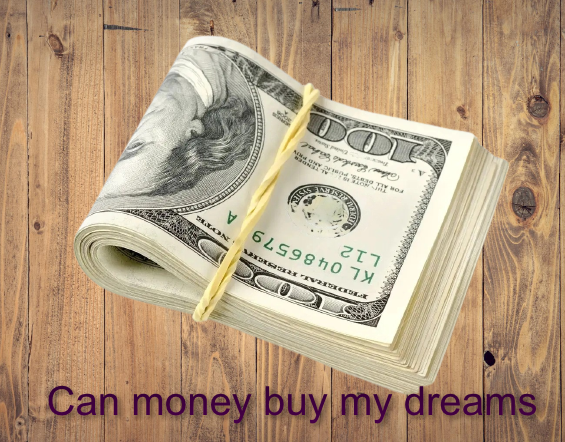This discussion has persisted for a long time. Can you buy happiness with money? Does having more money make you happier? Unfortunately, there is no simple solution. But you can’t buy true contentment with monetary means alone. Getting money that has a meaning and purpose can make it easier to find happiness in life. Acquiring wealth can be a powerful catalyst on the path to fulfillment. It’s not the source of happiness, but it can help create it. In those cases, it rarely goes deeper than skin-deep.
To put it plainly, money is not supposed to be a source of happiness. Happiness cannot be bought with money. When it does, it’s usually a temporary, surface-level one. You won’t find the lasting joy in it that you’re after. When it comes to “Can money buy my desires and dreams (non-materialistic)?” which is almost similar to the most asked question “Can money buy happiness?” While most individuals without money will say no, most people with money will say yes, even if they are miserable. With enough cash in hand, you can buy whatever your heart desires—including happiness.
If you’re a materialist and would be satisfied with anything, you might conclude that this is the case. But what about those of us who aren’t materialistic? Do they seem to be unable to buy happiness no matter how much money they have? You’re perhaps asking this because, despite your financial security, you’re unhappy. You scratch your head, trying to figure out where you went wrong in your pursuit of pleasure.
When you achieve your goals, you will be pleased, or so they say. They told me that if I only saved up enough money, I would be happy. They always said that if you only accumulated enough wealth, everyone would love you and you’d find happiness. No such thing occurred, though.

No money on Earth can Buy Your Dreams
Real solace, peace of mind, and spiritual or holistic dreams can never be bought with money, no matter how much of it you may have. It is only through pure love in your heart that you will be able to find real peace and happiness. When you have these two, you will have fulfilled all of your materialistic desires. All your mental dreams will be fulfilled, and you will then be able to live in peace.
You don’t feel loved because even when people show their affection, it’s only for what you can provide them materially. Getting your money drains your spirit, so you don’t feel successful either.
What Money Can Do
We’ve all heard the old adage that money can’t buy happiness, and we know it’s true. However, we can’t deny that money is a necessity for living, and for most of us, it’s a finite resource. How can we take our hard-earned money and use it toward things that will bring us the most joy? If you’re looking for some advice on how to maximize your enjoyment with your next purchase, you might want to check out the latest findings from the field of psychology.
The pursuit of material wealth does not guarantee contentment. Happiness may be bought with money. Anyone who doesn’t have it can tell you that. For instance, if we have more money, we can buy houses in more secure areas, pay for higher-quality medical treatment and nutritious food, find more satisfying employment, and enjoy more free time.
However, there is a limit that how far this can go ahead. The good things money can do, like allowing us to buy our ideal home once we’ve covered the basics like food, healthcare, and shelter, are often outweighed by the bad things it can do, like forcing us to work more hours at more stressful jobs.
Doing brings us more joy than possessing does. The vast majority of people think that having things will make them happy, not having meaningful experiences. A concert, a cooking class, or a vacation are all memorable experiences, but a new iPhone, purse, or automobile will be in your possession for much longer. The happiness we get after making a purchase is temporary. But in the long run, we become used to them, and the novelty wears off so that what made us joyful and delighted at first becomes the new normal.
On the other hand, the joy that comes from splurging on experiences is often cumulative. As a common example, we tend to split the cost of an experience amongst friends and family. Long after you’ve paid off the loan on your next car, you’ll be laughing about the time your brand new car broke down on the way to Venezuela and you had to spend the night in a seedy motel.
Donate some of your money to charity. Most individuals believe that investing in one’s own happiness is a more worthwhile use of financial resources than helping those less fortunate.
There are valid arguments against the idea that material wealth may provide contentment. The short answer is “no,” however. Let’s examine the many ways in which monetary success can’t buy happiness.
1. Money can’t and won’t make you happy.
Happiness cannot be purchased with money. Like technology, it is a useful instrument. Can joy be purchased with modern conveniences? Okay, so it serves its purpose as a tool. Like a tool, money can improve your quality of life.
Money cannot and will not make you happy. Tools and means are there to simplify and expedite daily tasks. In certain cases, money can purchase temporary happiness, or it might help you become financially secure and socially famous, but it won’t bring you the pure happiness that you are looking for.
The temporary joy that can be purchased with cash isn’t worth the investment. In a nutshell, it doesn’t last long and fades quickly. You can’t buy lasting happiness, not even for a few days, with a luxurious home or car.
People are what truly transform a house into a home, as they say. Without people, structures have no value. If you never have somebody to go on road trips with, having a car is pointless.
Happiness bought with money is fleeting; life soon takes priority. In the end, what matters is whether or not you are living.
2) You can’t purchase your way to success and thus it eludes your dream and happiness.
Obviously not if your definition of success is solely measured by financial gain. If you define success as getting rich, then you’ll never be successful.
Your goals don’t involve making money; you want to be an accomplished architect, journalist, and doctor.
A writer’s bank balance is not indicative of his or her success. Someone who has committed a crime and becomes extremely wealthy is not successful.
One is successful when they realize their goals and become the best at what they set out to do, not necessarily when they become the wealthiest.
No matter how prosperous someone becomes, they will always want more. When it comes to money, dissatisfaction never fades. On the contrary, you will come to recognize its worth if you make up your mind to be happy and pleased regardless.
Accept and celebrate your accomplishments and the things you’ve accomplished to this point.
Instead of being disappointed because you can’t afford everything you want, learn how to budget your money effectively. Perhaps your desires are not as warranted as you think they are. You can offset the cost of that fancy gym membership with a few relaxing strolls through the park. One day, the great styles at your local market may be better than those from global brands.
There’s no guarantee that reaching your goals or getting more stuff will make you happy.
3) If you simply care about financial gain, money will enslave you.
You become a slave to your wealth. In the same way that technology is a tool of life, money is not the means by which one might achieve happiness.
Money will enslave you and force you to labor for it if that’s all you care about (which is the majority of the world right now). That’s why everybody’s in such a hurry. People value financial success above all else, leading them on a fruitless pursuit.
Since there is no end goal, no one can explain why they need the money so desperately. Money is both a tool and a master in our modern world.
The pursuit of financial success diminishes moral conviction. Focusing on financial success might distract from what’s actually important in life. Meaning and purpose are what make life worthwhile. Money can buy us freedom, but we have to give it up. Not only does it deprive us of these things, but it also makes us feel as if we don’t need them anymore, as if money were the only thing that mattered.

4) Wealth breeds shallowness.
When people start thinking that money can buy them happiness, they start spending lavishly to try to feel that happiness. Because of this, the world appears one-dimensional and uninteresting.
A lack of complexity in others is detrimental to our happiness. If they want to be deep, they must ask questions about significance, meaning, and self-awareness. We can surround ourselves with all the material comforts money can buy, but it won’t fill the void within if we continue to chase it.
The accumulation of wealth leads to a more unequal society. Beyond the necessities and modest luxuries, money cannot purchase happiness. If those who have it are prepared to share it with those who need it, then there will never be a lack of funds to support initiatives that will make the world a better, more fulfilling place for all of us. Humans are an issue because they hoard wealth and will continue to do so until their dying days.
The saddest part is that they don’t even spend their money on things that make them happy. They put it in a bank account because they planned to use it someday. However, they died and left their money in the bank.
If more people realized that money can be used to create positive change in the world, then more families would be willing to put money toward their children’s goals. Millions of “utilize investors” would scour the globe seeking visionaries they could help realize their goals while also benefiting from the changes they brought about.
A world in which some individuals have too much money that they won’t accomplish anything with and others don’t have enough money to work on meaningful goals is the result of people being irresponsible and overly frugal with their resources. This is not a pleasant circumstance.
What can be bought or sold moves the world forward. The literal truth is that money is what drives society, and it isn’t always in positive and good ways. Most of the time, it just turns people into mindless drones who have no idea what they’re supposed to accomplish by pursuing it.
Having enough money is like having a wrench. The proper way to handle it is as a resource. But we have made it so central that it controls us.
5. Love is something that can’t be bought with money.
Love and a genuine connection cannot be purchased with cash. Those things are what bring lasting joy to people everywhere. If you don’t have someone to love and be loved by, it doesn’t matter how much money you have.
Since money cannot buy love, it cannot buy happiness either. No matter how many material goods you lavish on the one you love, love is not an obsession with material possessions. When two people find each other and instantly click, they have experienced the essence of love.
Love, connections, meaning, and significance are not commodities that can be purchased with cash. What makes us who we are is intangible and unattainable by monetary means. It’s true that cash can buy a lot of luxuries. You can actually get your hands on such things and experience them. Sadness, on the other hand, usually results from intangible factors that we have no control over.
Don’t be afraid to risk your dreams by turning down a better-paying job to follow your passion. Try something different and take advantage of everything life has to offer. Feel no remorse about jumping on any and all roller coasters and other adventures. YES! Money can purchase the most valuable commodity there is, regardless of who you are, and that is time. This means that you can go after your goals, even if they are about material things.
Value Your Time Than Money
Time is more valuable than anything else because it is the medium through which we accomplish goals, build relationships, and make memories. Money keeps us from using our time the way we want to, which is arguably more important than time itself. When we don’t have enough of it, it takes it away from us, but when we do, we can use it to buy more of it so that we can use our time as we see fit rather than as we feel we need to use it to make ends meet and accumulate wealth.
Until you have enough money to not have to worry about it, you spend most of your day working. In spite of the fact that money can’t buy happiness (and often causes stress), the conditions it makes possible unquestionably do. What makes you happy is waking up late, taking your time, and doing whatever makes your heart sing. You might feel good about yourself when you drive a very rare car or relax on a yacht in the sun. Again, your ideal scenario is dependent on the conditions that monetary resources bring into being.
No matter who you are, where you live, or how much money you have, the pursuit of happiness is inextricably linked to the pursuit of freedom. Money is the spirit that gave birth to the concept of freedom. Money can’t buy happiness, but it can buy freedom, and that means you can put your energy and attention where they belong: on your goals and your aspirations.
Disclaimer: The author’s views are his or her own. The facts and opinions in the article have been taken from various articles and political commentaries available in the online media and Eastside Writers does do not take any responsibility or obligation for them.
Note: Contact our Writers at www.eastsidewriters.com for writing Blogs/Articles on any niche. We have experts in various domains from Technology to Finance and from Spirituality to Lifestyle and Entertainment.







Pingback: Check These 10 Key Factors If You Are Looking To Buy Your First Car - Eastside Writers
Pingback: Unlocking the Secrets of Brain Hormones: Understanding How These Powerful Chemical Messengers Regulate Your Body's Functions - Eastside Writers
Pingback: The True Wealth: Why Peace of Mind Outweighs Money as the Ultimate Motivator - Eastside Writers